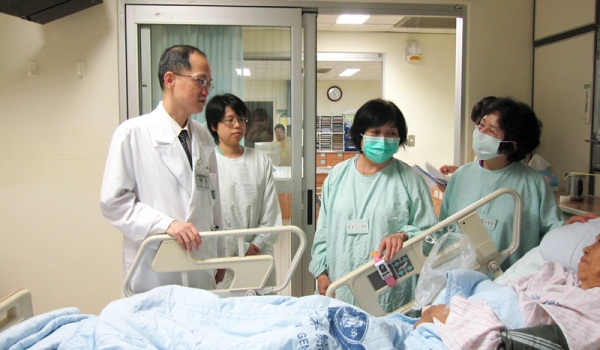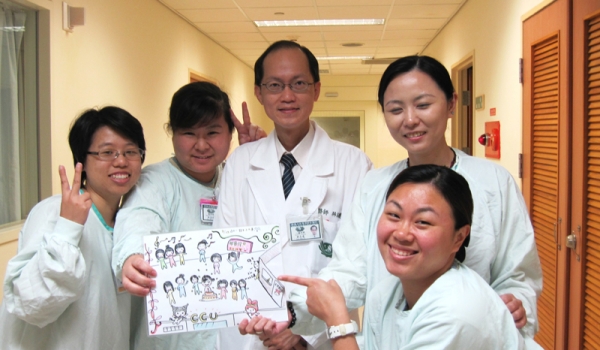Written by Chih-Ta Lin, Cardiologist, Dalin Tzu Chi Hospital.
Having treated all sorts of patients,
But the most unforgettable patient is “me”.
Never had any serious medical problem,
Why do I get this rare disease?
Pondering a surgery,
It is easier to do a diagnosis than to convince yourself.
I always had hiccups during a meal about a year ago. It is not unusual to have hiccups in between meals so I ignored the symptom. But the problem had worsened. My wife sometimes would discipline kids during meal time and I thought the tense atmosphere was the culprit. I asked my wife to refrain from lecturing kids during meals and she cooperated. But my hiccups did not go away. Finally, my wife let me have my meal before everyone else. But I still hiccuped. The problem of hiccups expanded to lunch time in the hospital. The more food I ate the more hiccups I had. I refrained from eating.At night, gastric acid backed up to my throat while I slept. Even with mouth goggling and rinsing, that foul odor still lingered around the following day.
I could neither eat nor sleep, and my weight plummeted. I lost five kilograms within three months. I thought I had “GERD”, Gastro Esophageal Reflux Disease. I took some stomach medicine but it did not help so I visited Dr. Kuo-Chih Tseng of gastroenterology. He performed a gastroscopy and found a slight gastric ulcer inside my stomach. In addition, the lower esophageal mucosa turns white and there is an expansion of the esophagus.
Dr. Tseng referred me to radiologist Dr. Chih-Wen Lin for an esophagography. I was surprised by the image of the lower esophagus showing an abnormal expansion. The passage between my stomach and esophagus is very narrow. Dr. Lin’s diagnosis is Achalasia, a disorder of the esophagus that prevents normal swallowing. Suddenly, I felt like I was struck by lightning. I thought to myself, “Good heaven, why me? Why do I get such a rare disease only found in the text book?” I just could not accept this striking fact.
Esophageal Achalasia is a symptom derived from the failure of lower esophageal sphincter neurons. It tightens up the esophagus when swallowing food particles. Food accumulates at lower esophageal, and then travels into stomach at a very slow pace. The cause of this disease is not known yet. The probability is one in one hundred thousand.
Clinically, patients with Achalasia have the following symptoms: difficulty in swallowing, hiccups, chest pains, vomits and weight loss. There are three treatment plans. The first is the use of internal medicine which is not promising. The second is an esophageal balloon angioplasty which may not cure the disease and a risk of breaking the esophagus. The third is to have a complete surgery which includes an endoscopic incision of esophagus together with an overlapping stomach surgery.
Even though I am a doctor, I am also a typical patient who has all sorts of fear. After reading Ms. Tiffany’s blog on the internet describing her battle against esophageal achalasia, I overcame the fear.
When facing the dilemma of a surgery, it is much easier to convince other patients than to convince yourself. I knew that taking drugs would only produce limited results but I still went with it hoping it would cure my problem.
The medicines are nitrate drugs and calcium channel blockers. The function is to relax the esophageal sphincter. These two drugs happen to be the same drugs cardiologists use to treat coronary heart disease. After trying both drugs, my symptoms persisted and the dizziness as a side effect convinced me to ditch the plan.
Owing to the illness, Dr. Lin is now more compassionate and patient with patients.
I watched my diet carefully. I stayed away from tomato, chocolate, mint, food with caffeine and non-bland food that would irritate the stomach. More meals were taken with less quantity for each meal. I also drank less water to avoid stuffing esophagus. It felt ghoulishly that I was starved to death but the food was there – I just couldn’t swallow.
Then I heard of Dr. Chao-Chuan Wu, director of general surgery at Taipei Tzu Chi Hospital, who had experience in such surgery, and consulted him. Dr. Wu referred me to gastroenterology physician Dr. Chien-Lin Chen at Hualien Tzu Chi Hospital for further check-up. Dr. Chen had done extensive research and collaborated with physicians overseas on this topic.
A series of check-ups was performed at Hualien Tzu Chi Hospital. First, an esophageal pressure measurement was performed to ensure it was truly a case of Achalasia. Next, a tube the size of a pen was inserted through my nostril into the esophagus to test the PH value and to exclude gastroesophageal reflux.
My parents accompanied me to check-in to the hospital after a surgery appointment with Dr. Wu was set. Two interns visited me and I joked with them.
“You two are lucky to come across a case of a rare disease as interns.” I asked them to perform a physical examination so they had more knowledge about this disease.
With a thin surgical gown I was shuttled into the operating room, an anesthesiologist asked me, “Are you nervous?”
I replied, “I am not nervous but I am shivering because the air conditioning in the operating room is too cold.” That were my last words I remembered before the surgery. Those could be my last words if the surgery failed. When I finally woke up, I had no recollection of the whole surgical procedure. Except for some minor pain getting in and out of the bed, I did not feel any major discomfort. The surgical opening was minimally invasive. I recuperated quickly and was discharged after three days in the hospital.
As the director of Cardiologic IU, Dr. Lin(middle) thanks the nurses for the quality service that patients and families trust.
A gastroesophageal myotomy surgery operation can cause reflux. For this reason, a laparoscopic gastric fold surgery was performed to prevent the reflux. A month after the surgery, I still had reflux problem occasionally but it was kept controlled with drugs. Slowly, the gastroesophageal reflux symptom disappeared completely. I am free from any gastrointestinal drugs and have gained two kilograms in weight.
After two weeks of recovery I returned to work at the hospital. An outpatient heard about my recent surgery and asked, “Do doctors get sick too?”
I replied, “Everyone gets sick sometimes. Doctors are human too. Surely doctors are not immune.” During the ordeal, I learned the importance of suffering. There is really not much one should ask for. It is a blessing when one can eat and sleep normally.
If I had a choice of whether getting a disease or not, I would really give some thoughts. After all, this rare disease had me rethink the meaning of life. I have learned and grown from it.
Dr. Lin (left) took vegetarian cooking lessons.





